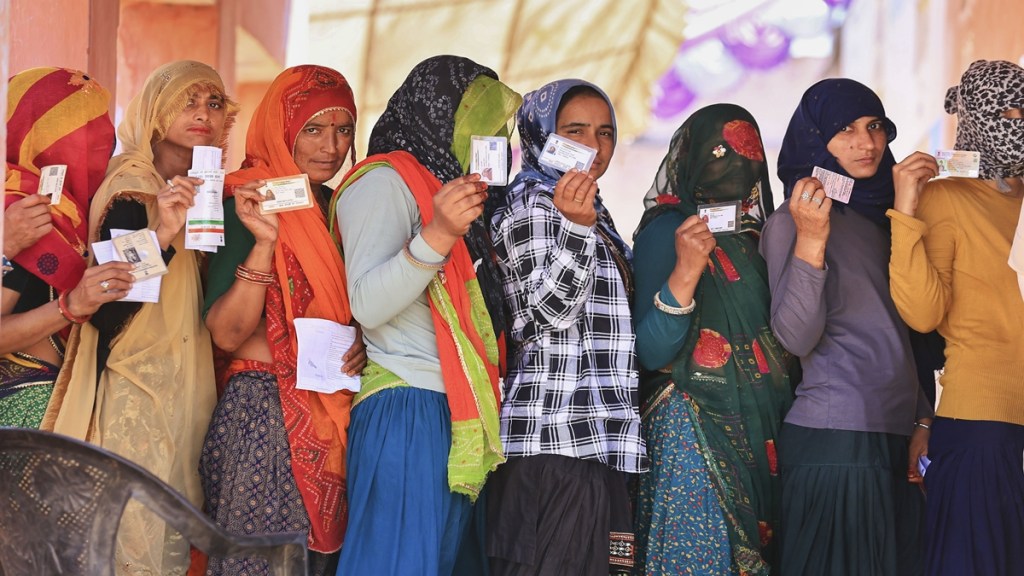India’s massive electoral undertaking began with a resounding turnout of approximately 63 per cent in the inaugural phase of Lok Sabha elections, encompassing 102 constituencies across 21 states and Union territories.
The Election Commission reported that despite sporadic episodes of violence and an unfortunate incident involving the accidental detonation of a grenade launcher shell in Chhattisgarh, resulting in the tragic death of a CRPF jawan, polling for the first and largest phase of the seven-phase elections remained predominantly peaceful.
Amid scorching temperatures and intermittent downpours, voters across the nation demonstrated resilience and determination as they queued up at polling stations, marking the initiation of the world’s most extensive democratic exercise at 7 AM.
Prime Minister Modi’s National Democratic Alliance (NDA) aims for a robust mandate for a third consecutive term, while opposition factions under the INDIA bloc aspire for resurgence following setbacks in previous electoral cycles.
Tripura led the turnout with 81.62 per cent, trailed closely by West Bengal at 80.55 per cent, Meghalaya at 74.50 per cent, Puducherry at 78.80 per cent, and Assam at 75.95 per cent. However, voters in six districts of eastern Nagaland refrained from casting ballots due to an imposed shutdown, advocating for a separate state.
Tamil Nadu, a focal point for BJP’s electoral endeavours, was among the regions where polling was conducted for all seats, alongside simultaneous assembly elections in Arunachal Pradesh and Sikkim.
First-time voters, newlyweds clad in traditional attire, individuals with physical disabilities, and elderly citizens transported on stretchers and wheelchairs were among those who exercised their democratic rights.
Minor glitches with Electronic Voting Machines (EVMs) were reported in Tamil Nadu, Arunachal Pradesh, Andaman and Nicobar Islands, and Assam. In West Bengal, polling was marred by violence in the Cooch Behar constituency, with clashes between TMC and BJP supporters resulting in numerous complaints lodged by both parties.
In strife-torn Manipur, a commendable turnout of 72.17 per cent was recorded, although incidents of intimidation and shooting were reported in several locations within the Inner Manipur seat.
In Chhattisgarh’s Naxal-affected Bastar Lok Sabha constituency, 67.56 per cent of voters cast their ballots amidst heightened security measures, notwithstanding an unfortunate incident involving a CRPF jawan and an officer injured in separate incidents. For the first time, voters in 56 villages in Bastar exercised their franchise in polling booths established within their communities.
In Tamil Nadu, where polling spanned 39 constituencies, a voting percentage exceeding 69.46 per cent was documented, despite delays in some booths attributed to technical glitches.
Arunachal Pradesh witnessed a turnout of 72.74 per cent, with sporadic delays in polling due to adverse weather conditions and technical issues with EVMs.
In Andaman and Nicobar Islands, 63.99 per cent of eligible voters cast their ballots, with minor EVM glitches swiftly addressed by officials.
In Assam, technical malfunctions with EVMs occurred in several polling booths, delaying the voting process. Additionally, a vehicle transporting an EVM encountered an unfortunate mishap as it partially submerged in a river.
In Bihar, amidst incessant rainfall, 48.88 per cent of voters exercised their franchise across four Lok Sabha constituencies, while 68.27 per cent voted in the first six hours of polling in Jammu and Kashmir’s Udhampur parliamentary constituency.
Rajasthan recorded a voter turnout of 57.26 per cent, while Uttarakhand saw 55.89 per cent polling. Maharashtra documented a turnout of 61.87 per cent, and Madhya Pradesh recorded 67.08 per cent across six Lok Sabha seats.
Over 16.63 crore individuals are eligible to vote in this phase, including 35.67 lakh first-time voters and 3.51 crore young voters aged between 20 and 29 years.
Counting of votes for the elections, spanning until June 1, will commence on June 4.
Notable candidates in the first phase include Union ministers Nitin Gadkari and Sarbananda Sonowal, Congress’s Gaurav Gogoi, and DMK’s Kanimozhi.
In addition to Tamil Nadu, polling was conducted for all seats in Uttarakhand, Arunachal Pradesh, Meghalaya, Andaman and Nicobar Islands, Mizoram, Nagaland, Puducherry, Sikkim, and Lakshadweep. Simultaneously, assembly elections were held in Arunachal Pradesh (60 seats) and Sikkim (32 seats).
The Election Commission deployed over 18 lakh polling personnel across 1.87 lakh polling stations to facilitate the electoral process.

